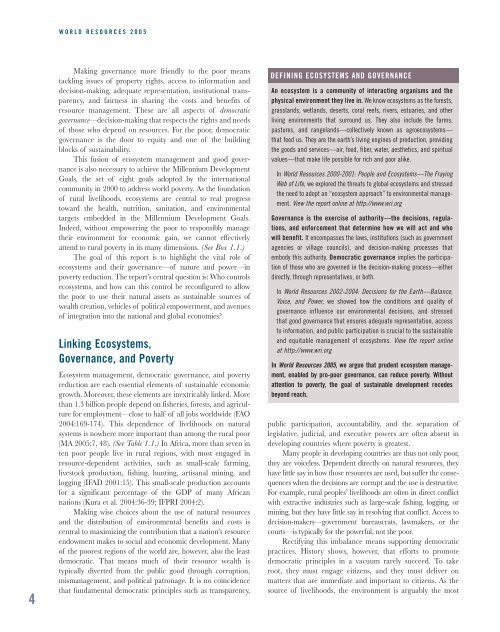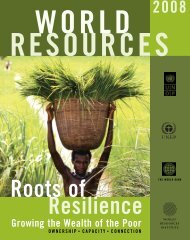jp8589 WRI.qxd - World Resources Institute
jp8589 WRI.qxd - World Resources Institute
jp8589 WRI.qxd - World Resources Institute
Create successful ePaper yourself
Turn your PDF publications into a flip-book with our unique Google optimized e-Paper software.
WORLD RESOURCES 2005<br />
4<br />
Making governance more friendly to the poor means<br />
tackling issues of property rights, access to information and<br />
decision-making, adequate representation, institutional transparency,<br />
and fairness in sharing the costs and benefits of<br />
resource management. These are all aspects of democratic<br />
governance—decision-making that respects the rights and needs<br />
of those who depend on resources. For the poor, democratic<br />
governance is the door to equity and one of the building<br />
blocks of sustainability.<br />
This fusion of ecosystem management and good governance<br />
is also necessary to achieve the Millennium Development<br />
Goals, the set of eight goals adopted by the international<br />
community in 2000 to address world poverty. As the foundation<br />
of rural livelihoods, ecosystems are central to real progress<br />
toward the health, nutrition, sanitation, and environmental<br />
targets embedded in the Millennium Development Goals.<br />
Indeed, without empowering the poor to responsibly manage<br />
their environment for economic gain, we cannot effectively<br />
attend to rural poverty in its many dimensions. (See Box 1.1.)<br />
The goal of this report is to highlight the vital role of<br />
ecosystems and their governance—of nature and power—in<br />
poverty reduction. The report’s central question is: Who controls<br />
ecosystems, and how can this control be reconfigured to allow<br />
the poor to use their natural assets as sustainable sources of<br />
wealth creation, vehicles of political empowerment, and avenues<br />
of integration into the national and global economies?<br />
Linking Ecosystems,<br />
Governance, and Poverty<br />
Ecosystem management, democratic governance, and poverty<br />
reduction are each essential elements of sustainable economic<br />
growth. Moreover, these elements are inextricably linked. More<br />
than 1.3 billion people depend on fisheries, forests, and agriculture<br />
for employment—close to half of all jobs worldwide (FAO<br />
2004:169-174). This dependence of livelihoods on natural<br />
systems is nowhere more important than among the rural poor<br />
(MA 2005:7, 48). (See Table 1.1.) In Africa, more than seven in<br />
ten poor people live in rural regions, with most engaged in<br />
resource-dependent activities, such as small-scale farming,<br />
livestock production, fishing, hunting, artisanal mining, and<br />
logging (IFAD 2001:15). This small-scale production accounts<br />
for a significant percentage of the GDP of many African<br />
nations (Kura et al. 2004:36-39; IFPRI 2004:2).<br />
Making wise choices about the use of natural resources<br />
and the distribution of environmental benefits and costs is<br />
central to maximizing the contribution that a nation’s resource<br />
endowment makes to social and economic development. Many<br />
of the poorest regions of the world are, however, also the least<br />
democratic. That means much of their resource wealth is<br />
typically diverted from the public good through corruption,<br />
mismanagement, and political patronage. It is no coincidence<br />
that fundamental democratic principles such as transparency,<br />
DEFINING ECOSYSTEMS AND GOVERNANCE<br />
An ecosystem is a community of interacting organisms and the<br />
physical environment they live in. We know ecosystems as the forests,<br />
grasslands, wetlands, deserts, coral reefs, rivers, estuaries, and other<br />
living environments that surround us. They also include the farms,<br />
pastures, and rangelands—collectively known as agroecosystems—<br />
that feed us. They are the earth’s living engines of production, providing<br />
the goods and services—air, food, fiber, water, aesthetics, and spiritual<br />
values—that make life possible for rich and poor alike.<br />
In <strong>World</strong> <strong>Resources</strong> 2000-2001: People and Ecosystems—The Fraying<br />
Web of Life, we explored the threats to global ecosystems and stressed<br />
the need to adopt an “ecosystem approach” to environmental management.<br />
View the report online at http://www.wri.org<br />
Governance is the exercise of authority—the decisions, regulations,<br />
and enforcement that determine how we will act and who<br />
will benefit. It encompasses the laws, institutions (such as government<br />
agencies or village councils), and decision-making processes that<br />
embody this authority. Democratic governance implies the participation<br />
of those who are governed in the decision-making process—either<br />
directly, through representatives, or both.<br />
In <strong>World</strong> <strong>Resources</strong> 2002-2004: Decisions for the Earth—Balance,<br />
Voice, and Power, we showed how the conditions and quality of<br />
governance influence our environmental decisions, and stressed<br />
that good governance that ensures adequate representation, access<br />
to information, and public participation is crucial to the sustainable<br />
and equitable management of ecosystems. View the report online<br />
at http://www.wri.org<br />
In <strong>World</strong> <strong>Resources</strong> 2005, we argue that prudent ecosystem management,<br />
enabled by pro-poor governance, can reduce poverty. Without<br />
attention to poverty, the goal of sustainable development recedes<br />
beyond reach.<br />
public participation, accountability, and the separation of<br />
legislative, judicial, and executive powers are often absent in<br />
developing countries where poverty is greatest.<br />
Many people in developing countries are thus not only poor,<br />
they are voiceless. Dependent directly on natural resources, they<br />
have little say in how those resources are used, but suffer the consequences<br />
when the decisions are corrupt and the use is destructive.<br />
For example, rural peoples’ livelihoods are often in direct conflict<br />
with extractive industries such as large-scale fishing, logging, or<br />
mining, but they have little say in resolving that conflict. Access to<br />
decision-makers—government bureaucrats, lawmakers, or the<br />
courts—is typically for the powerful, not the poor.<br />
Rectifying this imbalance means supporting democratic<br />
practices. History shows, however, that efforts to promote<br />
democratic principles in a vacuum rarely succeed. To take<br />
root, they must engage citizens, and they must deliver on<br />
matters that are immediate and important to citizens. As the<br />
source of livelihoods, the environment is arguably the most

















